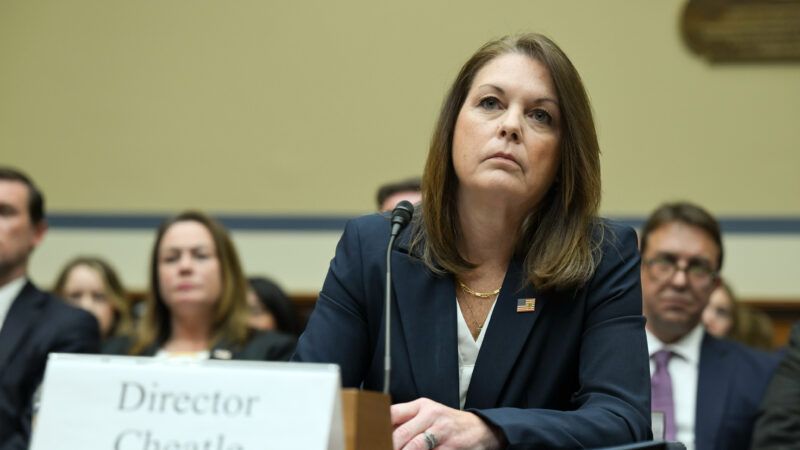Secret Service Director Receives Bipartisan Condemnation in Oversight Hearing
While there was some political grandstanding among members of Congress, the bipartisan demand for answers was refreshing.

On Monday, Secret Service Director Kimberly Cheatle appeared before the House Oversight Committee, a little over a week after the attempted assassination against former President Donald Trump.
While there was certainly some partisan grandstanding, both Republican and Democratic representatives took Cheatle to task over the blatant security failure.
On July 13, 20-year-old Thomas Matthew Crooks fired multiple shots as Trump spoke at a campaign rally in Pennsylvania; a bullet grazed Trump's ear, two other attendees were wounded, and a former Buffalo fire chief, Corey Comperatore, was killed while shielding his wife and two daughters. Crooks had climbed onto the roof of a nearby building and perched on his stomach with a semiautomatic rifle; a Secret Service sniper shot and killed Crooks a few seconds after the shooting started.
In the ensuing days, details came out that looked even worse for the Secret Service. Rallygoers had identified Crooks to law enforcement as a suspicious person more than an hour before the shooting, and Secret Service snipers spotted him on the roof 20 minutes before he started firing. Cheatle claimed that agents were not posted on top of that building because its "sloped roof" presented a "safety factor," but she gave no explanation for why the building was not included in the Secret Service's security perimeter (nor how a 20-year-old with no tactical training was able to traverse the dangerous roof without issue). The Washington Post reported over the weekend that the agency had previously denied Trump's requests for additional security personnel.
"It was unacceptable," Cheatle told ABC News's Pierre Thomas on July 15. "And it's something that shouldn't happen again….The buck stops with me."
But in Monday's hearing, Cheatle gave noncommittal answers, noting that she did not have full information or was "still verifying timelines." She noted that she was waiting on "a full and complete report of exactly what happened," hopefully within 60 days, before she could address specific shortcomings or plans of action.
Members of Congress were not impressed.
"You're full of shit today," Rep. Nancy Mace (R–S.C.) told Cheatle, prompting calls from other committee members to "maintain decorum." Mace charged that the Secret Service had not provided any information the committee had requested—including a list of "all law enforcement personnel" present at the rally, audio and video recordings, and internal memos—despite being asked on July 15.
"You are being dishonest here with this committee," Mace continued. "We haven't gotten a single document or piece of information or data from you or your agency in [relation] to the rally, that we have asked you for."
"You've answered more questions with an ABC reporter than you have with members of Congress," Chairman James Comer (R–Ky.) noted before Mace began. "We have a lot more questions, the American people are demanding that we get answers to those questions, and that's what the purpose of this hearing is today. I strongly implore you to answer those questions."
And it wasn't just Republicans who took issue with Cheatle's testimony.
"[There are] elections happening across the country in about 100 days," noted Rep. Alexandria Ocasio-Cortez (D–N.Y.). "The notion of a report coming out in 60 days, when the threat environment is so high in the United States, irrespective of party, is not acceptable….It has been 10 days since an assassination attempt on a former president of the United States; regardless of party, there need to be answers."
Cheatle noted that the rally stage was about 200 yards from the building where Crooks fired from. "The individual used an AR-15 in order to act out his assassination attempt," Ocasio-Cortez said. "An AR-15 has a range of about 400–600 yards. My question is, why is the Secret Service protective perimeter shorter than [the range of] one of the most popular semiautomatic weapons in the United States?"
"There are a number of weapons out there with a number of ranges," Cheatle responded. "A perimeter was established, and even though there were buildings that were outside of that perimeter—it wasn't just that building, there were a number of buildings in the area—there was overwatch that was created to help mitigate some of those buildings."
Despite Cheatle's unwillingness to give specifics, the hearing did glean some useful admissions: For example, Cheatle admitted to Mace that the events in Pennsylvania were "preventable" and constituted a "colossal failure."
This is not to say that no members of Congress used the opportunity to grandstand. Rep. Rashida Tlaib (D–Mich.) used her allotted time to inveigh against "assault weapons," comparing the shooting in Pennsylvania to mass shootings in other parts of the country. "We just can't continue to allow this to happen," Tlaib said, calling on Congress to pass gun control legislation—even though the gun was purchased legally more than a decade ago, when the shooter was in elementary school.
Moments later, Rep. Tim Burchett (R–Tenn.) suggested that Cheatle only got her job because she was a woman: Referring to the diversity, equity, and inclusion (DEI) framework that emphasizes considering applicants of diverse backgrounds, Burchett called Cheatle "a DEI horror story."
Still, it's encouraging to see lawmakers from both sides of the aisle recognizing the enormous failure that took place last weekend, when law enforcement agents allowed an identified suspicious person to shimmy up to the top of a building with a long-range rifle and take multiple shots at a former president and major-party candidate.
In a letter released after the hearing, Comer and Rep. Jamie Raskin (D–Md.)—respectively the committee's chairman and ranking member—called on Cheatle to resign. The lawmakers charged that in her testimony, she had "failed to provide answers to basic questions regarding that stunning operational failure and to reassure the American people that the Secret Service has learned its lessons and begun to correct its systemic blunders and failures."


Show Comments (60)